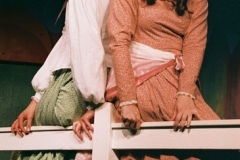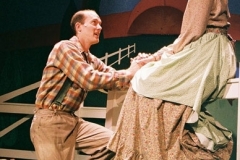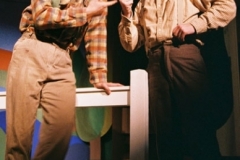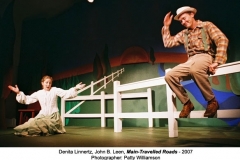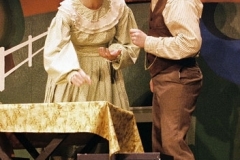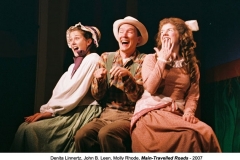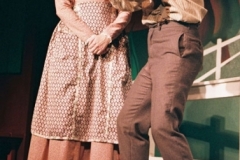Book & Lyrics by Dave Hudson
Music by Paul Libman
Based on the timeless tales by Wisconsin writer Hamlin Garland, Main-Travelled Roads tells two tales of love, one laugh-out loud funny, the other one bittersweet but very satisfying.
The stories combine to form a show that is both tuneful and charming. Main-Travelled Roads is about lives and loves in early Wisconsin and has already proven to be a crowd-pleaser.
Door County Advocate
MARTY LASH - September 2007
‘Main-Travelled Roads’ great family entertainment
It’s not customary for me to call a play or musical “magical,” but there is no other word to describe American Folklore Theatre’s latest offering.
Each fall it has been customary for the company to present a show after the goings-on at Peninsula State Park have closed.
In recent years AFT staged very entertaining reviews of music by Simon and Garfunkel, the Weavers and John Prine. They were great events.
This year they decided to take a risk with a brand-new show.
“Main-Travelled Roads” has been tried out in one form or another at small, Chicago, New York and Madison theaters. Those productions were essentially workshops and the show is now receiving its world premiere in Door County.
It’s a musical about the struggles of young lovers in rural Wisconsin during the 1880s.
The basic story revolves around a young couple that splits up because Will, as played by Chase Stoeger, decides to go off to college. Later his character drops out of school and goes into shipping.
His intended, Aggie, played by Molly Rhode, marries someone she is not in love with because she does not want to wind up an old maid. Aggie marries a grim farmer, Dave, played by John B. Leen.
There is the “creamery man” or Ed, also played by Leen. His character is looking for a good wife and has his eyes on Lucinda, also played by Rhode.
Lucinda flirts with Ed but winds up rebuffing him. Meanwhile, a German woman, Nina, played by Denita Linnertz, has had her eyes on Ed all along. Ed and Nina wind up together.
After a six-year absence, Will shows up on Aggie’s doorstep. He professes his undying love.
At first Aggie shows him the door but eventually the two leave town (with Aggie’s child) and presumable live happily ever after.
Dave eventually comes home to an empty house.
This might sound a little complicated but the show is not hard to follow.
The four actors slip in and out of their 11 characters easily. We always know whom we are dealing with since each actor clearly delineates each part.
Aside from being a charming story, “Main-Travelled Roads” has well-written songs. Whether lighthearted or silly, all gives you a slice of each character’s personality, hopes and dreams.
Among the show’s best songs, Will and Aggie sing “Small Town Telegraph” which reminds us that in rural communities word travels fast.
Aggie has a close friend Delia played by Linnerrtz. Together the two women sing “Talking Nonsense.”
It’s about two friends who sit together and talk about everything and nothing. The song echoes Steven Sondheim.
The opening and closing tune, “Main-Travelled Roads” is one of the show’s best-written songs. It’s high-spirited and optimistic.
Each of the four actors in this musical is splendid. The cast is personable, talented and engaged.
Leen has great stage presence and an amazing baritone voice. He is fun to watch when playing the happy-go-lucky creamery man. Yet, he plays Dave with dead seriousness.
Linnnertz is a tall, stately actor who commands our attention. She is particularly funny when playing Nina, the German flirt.
Stoeger’s tasks are mighty. He plays three male parts and briefly shows up in a female part, Frau Haldeman, Nina’s slightly crazy mother. His acting and singing are first class.
Rhode is a standout. She is an amazing actor, displaying an incredible range of emotions and a voice that glistens. She is funny, tragic and very involved.
During one of the few dark moments in this show she manages to generate tears. That is acting at its very best.
Jeff Herbst is the show’s director. His leadership is caring and unobtrusive.
Special kudos are in order for composer Paul Libman and lyricist/writer Dave Hudson. Their musical is perfect entertainment for the whole family.
Marty Lash is a member of the North American Music Critics Association and the American Theater Critics Association and a former contributing editor and classical music reviewer for the Illinois Entertainer. He can be reached at mr1220@msg.dcwis.com.
Green Bay Press Gazette
WARREN GERDS - August 2007
AFT musical embraces state author's stories
EPHRAIM – People from Wisconsin farmland in the 1880s come to life in the new American Folklore Theatre musical, “Main-Travelled Roads,” playing through Oct. 28 in Ephraim Village Hall.
It’s a hybrid show. It’s part drama and part light-hearted, in a rural way. Sometimes the characters deal with soulfully sad situations, and sometimes they dance on a fence.
At the core, it’s about people “looking for something we all call love.”
As woven by Dave Hudson (book and lyrics), Paul Libman (music), Jeffrey Herbst (director) and the cast, the show is engaging. It comes with a pedigree. It will be produced in coming months in New York City as the winner of the 2007 Richard Rodgers Reading Award. It’s the third time writers associated with American Folklore Theatre have received the award.
The most clout in the production at Ephraim is delivered by the women – the actresses and their set of characters (they play more than one).
Molly Rhode is sometimes a giddy girl gushing over the Creamery Man and sometimes the downtrodden wife of a stubborn lout who refuses to join the mechanized age with his threshing business.
Denita Linnertz delights and tugs at the heartstrings as Nina, a barefoot girl with a cracked German accent and a yen to become a “Yankee girl” and find the man of her heart.
Chase Stoeger’s multiple roles include a hilarious bit as an old woman and, more importantly, a young man whose crushed optimism sets a series of events in motion.
John B Leen is most effective as the Creamery Man, who plays the field as he goes from farm to farm.
Nicholas Towns is musical director and pianist for the carefully crafted Hudson-Libman songs.
Predictably, the show has a bit on gossip found in a small town, but Hudson and Libman bring it out in a clever way in the rhythmic “Small Town Gossip.”
Cleverness-plus sparks “Threshing.” From the set, signposts and the sun are transformed into a threshing machine, while Leen leads a song that puts the dynamics of threshing to music and movement.
Hudson and Libman re-create a jolly rag of yore in the rollicking “Nina the Dutch Girl.”
Leen, Linnertz, Rhode and Stoeger are strong singers in a variety of ways.
Picking nits: Stoeger needs shoes in tune with the time (as everybody else), Leen’s characters have him react more than act and the set has a homemade feel.
On the other hand, “Main-Travelled Roads” is another new, imaginative original show for American Folklore Theatre. It takes us to another era in our great state and tells us stories worth telling again, enhanced by song.
Garland lived from 1860 to 1940. “Main-Travelled Roads,” a 1891 collection of fictional stories inspired by his life on the farm, was his first success.
"Main-Travelled Roads" Recipient of the 2007 Richard Rodgers Award
This fall, American Folklore Theatre will produce the world premiere of Main-Travelled Roads, with book and lyrics by Dave Hudson and music by Paul Libman. This heartwarming musical is a 2007 recipient of the coveted Richard Rodgers Award for Musical Theatre. This is now the second time Mr. Libman and Mr. Hudson have won this prestigious award, making them the only writing team to ever do so for two musicals.
Mr. Hudson and Mr. Libman adapted Main-Travelled Roads from an 1890 volume of stories of the same name by Wisconsin native Hamlin Garland. The musical weaves together several of Garland’s tales into two main stories with fourteen songs. Last year,Main-Travelled Roads was performed in both the Stages Festival of New Musicals in Chicago and the Fall Festival of New Plays at Madison Repertory Theatre. Jeffrey Herbst, Artistic Director of AFT, directed the workshop presentation in Madison and as a result offered the authors the world premiere production this fall.
This talented writing team has only been working together for five years and has already produced five musicals. Their first musical, Muskie Love, was written for the 2004 AFT summer season, returned for the 2005 season, and subsequently went on to a sold-out run at Madison Repertory Theatre in 2006. Their second effort, Dust and Dreams: A Sandburg Celebration, was the other winner of the Richard Rodgers Award and as a result received a staged reading Off-Broadway at the York Theatre in New York City.
Mr. Hudson and Mr. Libman were recently in New York City to receive the award for Main-Travelled Roads, which was presented by Stephen Sondheim at a ceremony hosted by the American Academy of Arts and Letters.
The award is named for American composer Richard Rodgers, who endowed the award in his name shortly before his death in 1978. Rodgers’ iconic status as a musical theatre composer is exemplified by his partnerships with Lorenz Hart and Oscar Hammerstein, the former yielding numerous American song standards including “My Funny Valentine” and “Blue Moon” and the latter resulting in beloved musicals like Oklahoma, South Pacific, and The Sound of Music.
Main-Travelled Roads and Dust and Dreams: A Sandburg Celebration are two of only sixty-one musicals to receive the Rodgers Award since its inception in 1980. Another AFT writing team, Fred Alley (co-founder of AFT) and James Valcq, also won the award in 2002 for The Spitfire Grill.
The latest Libman/Hudson collaboration, A Cabin with a View, was commissioned by AFT and is currently playing in the 2007 summer season. This charming adaptation of E.M. Forster’s A Room with a View is set in America in 1959 on both the UW Madison campus and in the Rocky Mountains.


